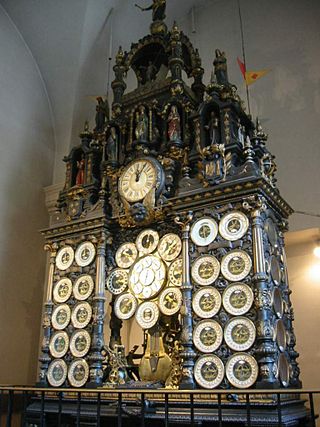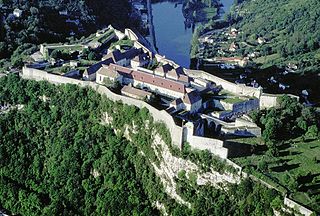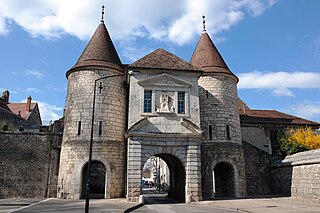17 Sights in Besançon, France (with Map and Images)
Legend
Welcome to your journey through the most beautiful sights in Besançon, France! Whether you want to discover the city's historical treasures or experience its modern highlights, you'll find everything your heart desires here. Be inspired by our selection and plan your unforgettable adventure in Besançon. Dive into the diversity of this fascinating city and discover everything it has to offer.
Sightseeing Tours in BesançonActivities in Besançon1. Citadelle de Besançon
The Citadel of Besançon is a 17th-century fortress in Franche-Comté, France. It is one of the finest masterpieces of military architecture designed by Sébastien Le Prestre de Vauban. The Citadel occupies 11 hectares on Mount Saint-Etienne, one of the seven hills that protect Besançon, the capital of Franche-Comté. Mount Saint-Etienne occupies the neck of an oxbow formed by the river Doubs, giving the site a strategic importance that Julius Caesar recognised as early as 58 BC. The Citadel overlooks the old quarter of the city, which is located within the oxbow, and has views of the city and its surroundings.
2. Musée du Temps
The Musée du Temps de Besançon is a museum of history and watchmaking located in Besançon in the Doubs department in the Bourgogne-Franche-Comté region, housed in one of the most beautiful palaces in the city, the Palais Granvelle.
3. Musée de la Résistance et de la Déportation

The Museum of the Resistance and Deportation of Besançon, labeled Museum of France, is located in the heart of the Citadel of Besançon, a mecca of culture and tourism in Franche-Comté. Closed since 2020 for a complete overhaul, it reopened its doors on September 8, 2023.
Wikipedia: Musée de la Résistance et de la Déportation (Besançon) (FR)
4. Église Saint-Maurice
The Church of Saint-Maurice is a church in the city center of Besançon in Franche-Comté dedicated to Saint Maurice. Its foundation is attested as early as the sixth century. The church was demolished and rebuilt several times; the current Jesuit-style building dates from the early eighteenth century.
5. Église Saint-Pierre
The Saint-Pierre de Besançon church is located in the Boucle district, on the Place du Huit-Septembre, in the heart of the city center. It is named after the first pope and apostle of Christ of Christendom, St. Peter. It is part of the Saint Etienne Pastoral Unit which includes the churches of the city center as well as that of Morre.
6. Horloge astronomique

The Besançon astronomical clock is housed in Besançon Cathedral. Auguste-Lucien Vérité of Beauvais designed and built Besançon's present astronomical clock, between 1858 and 1863. It replaced an earlier clock that Bernardin had constructed in the 1850s that proved unsatisfactory. Besançon's clock differs from those in Strasbourg, Lyon, and Beauvais. The clock is meant to express the theological concept that each second of the day the Resurrection of Christ transforms the existence of man and of the world.
7. Abbaye Saint-Paul
The Abbey of Saint-Paul de Besançon is a former Augustinian abbey of the seventh century in the historic center of Besançon in Franche-Comté. A prestigious abbey in the Middle Ages, the nave of the Gothic abbey church of the fourteenth century is still used as a municipal lapidary reserve.
8. Synagogue de Besançon

The Synagogue of Besançon is a Jewish congregation and synagogue, located at 23 Quai de Strasbourg, in the Battant area, near the old part of town, in the city of Besançon, in the Bourgogne-Franche-Comté region of France. The stone synagogue was built in 1869 and was inaugurated on 18 November.
9. Maison natale de Victor Hugo
Victor Hugo's birthplace is an apartment in the historic center of Besançon, where the French humanist ideologue writer Victor Hugo (1802-1885) was born on the 1st floor of 140 Grande Rue de Besançon in the Doubs in Burgundy-Franche-Comté. These places of literary memory were converted into a museum in 2013, labelled Maisons des Illustres. The facades and roofs have been listed as historical monuments since 30 April 1942.
10. Chapelle Notre-Dame des Buis
The Chapel of Notre-Dame des Buis, commonly known as the Chapel of the Boxwood, is a Christian building dating from at least the seventeenth century, located in Besançon in the district of La Boucle. The site in which it is located as well as its architecture make it one of the most remarkable chapels in the city.
11. Statue Adolphe Veil-Picard
The Veil-Picard family is a Jewish family, originally from the Haut-Rhin. The grandfather, Aaron Veil, born on 5 May 1794 in Oberhagental, settled in Besançon where he worked as a banker. He married Pauline Hauser-Picard in 1823; their descendants bore the surname Veil-Picard. Aaron died on October 20, 1868 in Besançon.
12. Chapelle Notre-Dame-du-Refuge
The Chapel of Notre-Dame du Refuge is an eighteenth-century Baroque style Catholic chapel located in Besançon (Doubs), with a monumental dome in polychrome glazed tiles, attached to a former "Convent of the Refuge" of 1709 and then to the Saint-Jacques Hospital in Besançon in 1802. Located in the historic centre of Besançon in the Doubs in Franche-Comté, it is dedicated to the Virgin Mary and classified as a historical monument in 1970.
13. Mémorial Notre-Dame de la Libération
Our Lady of Liberation is a church built in an old fort at nearly 500 m of altitude near the hamlet of Chapelle des Buis, in the outskirts of the city of Besançon, in the department of Doubs, in eastern France.
14. Porte Rivotte
The Porte Rivotte is a military building located in the Rivotte sector, near the historic center of Besançon. It is one of the last two city gates of Besançon, along with the Carved Gate, still elevated.
15. Promenade Micaud
The Parc Micaud or Promenade Micaud is a public garden in Besançon located on the banks of the Doubs River. It is named after Jean-Agathe Micaud, former mayor of Besançon from 1835 to 1843, and initiator of the park in 1843.
16. Église Sainte-Madeleine
The église Sainte-Madeleine is a neoclassical 18th century hall church in the Battant district of Besançon, France, dedicated to Saint Mary Magdalene. Antoine-Pierre II de Grammont, the archbishop of Besançon, had it built from 1746 to 1766 to plans by the architect Nicolas Nicole.
17. Porte taillée
The Porte taillée is a city gate located in Besançon (France). It was drilled in the rock of Saint-Étienne hill by the Romans under Vespasian or Marcus Aurelius, for the aqueduc of Besançon between Vaire-Arcier and square Castan. The passage is redeveloping during the Middle Ages in real city gate, and fortified in 1546 by Vauban under Charles Quint. The Porte taillée is classified Monument historique since 1944.
Share
How likely are you to recommend us?
Disclaimer Please be aware of your surroundings and do not enter private property. We are not liable for any damages that occur during the tours.













